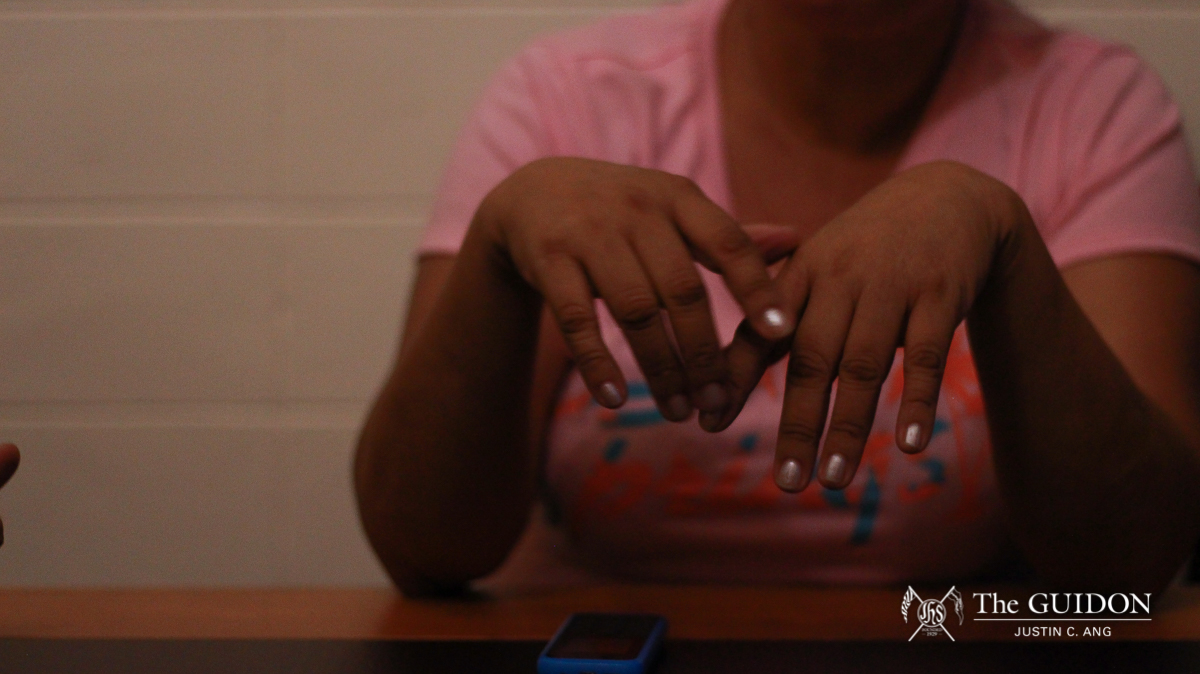Members of the Coalition of Ateneans for Indigenous Peoples (CAIP) met with a Lumad rights defender at the Loyola School of Theology on July 18.
CAIP is a student coalition that aims to deepen the discourse on Lumads and other indigenous peoples and strengthen the legal foundation of their growing institutions.
The speaker, who was also the bae or female leader of the Obo Manobo tribe, revealed that the violence escalated not only in her hometown in Kidapawan, North Cotabato but also in other tribal communities.
On April 1, a protest by several Lumad farmers in response to food shortages resulted in violent skirmishes with the Philippine National Police, leaving three farmers dead with dozen others wounded.
She also revealed that private armies are wreaking havoc in their clans while taking over their ancestral domain.
As a defender of Lumad rights, the speaker reports human rights violations committed against fellow Lumads in her community. She informed members of CAIP that Lumad leaders, including herself, have went into hiding after spikes in violence struck their respective tribes across far-flung sitios in North Cotabato and Davao City.
CAIP Consultant Fr. Bert Alejo, SJ and Theology Instructor Bobby Guevara were also present in the meeting.
Dispute in ancestral land
The speaker recalled a shooting incident last Friday at Sitio Kahusayan in Davao City, where her close acquaintance, Datu Danny Diarog of the Bagobo tribe, was critically wounded from gunshots fired by a motorcycle-riding gunmen.
However, Diarog’s companion, Hermie Alegre, a Parent-Teachers Association Secretary of a Lumad school, died from the incident.
Upon hearing the news, the speaker retreated immediately from the area as concern for her protection. Several tribal chieftain leaders have also been alarmed about the safety of their communities.
“’Yung ibang clans [nagtatago sa] forest ngayon. Ganoong makasalimuot ang sitwasyon (Other clans are now hiding in the forest. The situation is that complicated),” she said.
The speaker pointed to the private army of Pastor Apollo Quiboloy, the founder and leader of Davao-based charismatic group Kingdom of Christ, as one of the main culprits of land-grabbing.
The recent incident was reminiscent of the killing of Diarog’s father, Datu Dominador, eight years ago. The motive behind the murder was attached to Quiboloy’s name due to the annexation plans of his church within the ancestral domain of Diarog’s tribe.
“The ancestral domain is composed of seven sitios, seven villages, and seven clans. ‘Yung Sikao clan, around 2000 hectares, kasama ang forest at mga falls, ‘yun ang gustong kunin ni Quiboloy (Sikao Clan, which owns 2000 hectares in land, comprises of forests and waterfalls, which Quiboloy wants to take over),” the speaker claimed regarding the clan residing in Mount Apo.
Quiboloy’s group, however, denied accusations in both incidences involving the Diarog family. Despite this, the speaker, owing to her close cooperation with Diarog, feared that Quiboloy’s priivate intelligence would trace her location.
Despite the consequences, the speaker is optimistic about achieving justice for her fellow tribesmen. “Getting away is not cowardice. It is hard to prove [these documents] but whatever information is retrieved from the ground, it’s beginning to happen now,” she said.
Conflict and cooperation
Since the conflict among farmers erupted in Kidapawan, the speaker praised CAIP for showing solidarity with the Lumads and supporting their rights.
The speaker shared that the police intervened in the distribution of monetary donations to the Kidapawan victims. She said that while victims continue to suffer from food shortages, the situation has worsened as other Lumad communities remain vulnerable to danger.
CAIP Head Dane Ancheta said that the student coalition served as the coordinator in the rice distribution programs to victims.
“We made the connections with the IP groups and Ateneo de Davao [University]. We also lobbied and asked for monetary donations here in Metro Manila,” she said.
Since CAIP is not directly involved in the logistics, Ancheta said that the distribution of the donations are beyond their control.
Call to action
Given the recent developments in the Lumad tribes, Ancheta said that CAIP is still discussing their plans to shed light on the issue and spread awareness.
“We wanted to show support for the communities to know that we’re aware [of what’s happening]. We will fight alongside the Lumad communities against the unjust land-grabbing of private sectors,” says Ancheta.
Ancheta said that Ateneans should “always be open and critical with things we hear” to move forward with the events that transpired. “We have to be sensitive to the situation. There are injustices happening to people but that doesn’t mean we should be complacent,” she said.
On behalf of CAIP, Ancheta said that Ateneans could emulate the courage and vigilance embodied by the Lumad rights defender.
“Let us not absolve ourselves of the responsibility [to take action]. We’re in the position to do [something]. It is a call to action, not just awareness,” said Ancheta.







